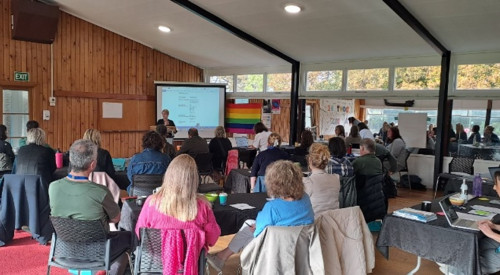What’s happening with AoD education in New Zealand schools?
Research 8 June 2023

Across Aotearoa, there are a wide range of ways secondary schools educate their students about alcohol and other drugs (AoD).
For many years, the goal of AoD in the NZ curriculum has been harm minimisation. Evidence shows, however, that some methods of teaching students AoD are more effective at reducing harm than others. So, what is the current state of AoD education in New Zealand? And what could we be doing better?
Youth health research and curriculum design expert, Dr. Jennifer Robertson, whose career as a secondary teacher has evolved into a professional teaching fellowship at Auckland University, says this is surprisingly difficult to determine. In recent years in NZ, she says there has been a lack of in-depth research into AoD education.
A short history of AoD education in NZ
Alcohol and drug education in New Zealand secondary schools has varied over the years, with programmes like D.A.R.E, and FADE being used until approximately 2000. Research showed, however, that these programmes had limited and short-lived effectiveness. Some programmes, like Scared-Straight, were designed to deter antisocial behaviour but were shown to have unexpected negative influences on some young people. Similarly, AoD programmes which focused on abstinence have been shown to have limited effectiveness.
A better way
Current Ministry of Education Guidelines state that school AoD education programmes have a role in building students’ knowledge and understanding and to develop students’ skills to critically analyse messages about alcohol and other drugs. It recognises that one-off events, such as expos and presentations that focus on delivering information, are not effective. They don’t take account of an individual student’s learning needs, or particular school contexts.
Dr Robertson says relationship and sexuality education (RSE) has dominated the research landscape, both in terms of what the Ministry of Education has been interested in and what researchers are interested in following up on.
However, there are ways to identify youth trend in AoD use. The most recent Youth2000 survey, conducted in 2019 found:
- Between 2001–2019, there were very large declines in cigarette smoking and binge drinking among New Zealand secondary school students.
- Most students do not smoke, vape, drink alcohol, or use marijuana or other drugs.
- Regular cigarette smoking is now uncommon overall, but ethnic and socioeconomic differences remain glaring.
- Vaping has emerged as a new issue.
- Binge drinking is still prevalent, especially among older students.
- See more Youth19 survey results here.
The 2022 Secondary School Teacher Survey of Relationships and Sexuality Education also gives useful insights, and can be taken as a proxy for AoD education, says Dr Robertson.
The RSE survey found that many teachers lacked the training and time to teach RSE confidently, and Dr Robertson believes this is likely the case for AoD education too.
Challenges for schools regarding alcohol and other drugs

Dr Robertson says that in secondary schools, pressure on delivering curriculum is significant and when young people are developmentally ready for meaningful health learning opportunities, topics such as navigating social media, relationships, sexuality and gender and AOD are often squeezed into just 7 available lessons per year.
In addition to the curriculum pressure, Dr Robertson also raises that the lack of training for teachers in these sensitive areas is also problematic. “It can be very hard for a new teacher, to teach RSE. In some ways it’s better for the more experienced teachers to take the classes, using the good resources that are already available – so there is quality teaching and learning.”
“So whatever is happening – the mental health topics, AoD, RSE, maybe some teaching around better food and nutrition. Well, that’s the point – often, it’s not happening,” she says.
Another difficulty for schools can be around the requirement to work with their communities. Schools must consult with communities on their curriculum, including on RSE and AoD, and some parents may oppose what is set down in Ministry of Education policies and guidelines, putting schools in a difficult position.
In NZ, the health and physical education curriculum area is compulsory for students in years 1–10. "After year 10, health becomes an elective topic, which 95% of students do not take, therefore 95% do not have the opportunity to proactively explore their health decisions," Dr Robertson says.
How can schools improve their delivery of AoD and RSE education to students?

One solution, Dr Robertson says, is for outside agencies to work with school communities. NGOs and outside providers of programmes can be an excellent resource for schools who need their communities to upskill on health-related requirements and issues affecting students.
Teachers may be best suited to delivered programmes within schools, being pedagogically trained and responsive to the needs of their students, particularly in a cultural sense, but external providers can work well for parents.
This could help protect schools from pressure to respond reactively to an issue or event. Schools may feel pressured into running a “roadshow” or a one-off assembly on an issue, such as vaping, but as already stated above, one-off events are ineffective.
A much more effective way is to support teachers to deliver effective programmes in the time that is available, in the context of a whole school approach. The Ministry of Youth Development (MoYD) developed guidelines for alcohol and drug education based on 16 principles of best practice framed within a youth development policy approach.
The guidelines aim to enhance students' skills, knowledge, and attitudes to mitigate substance use-related harm. They set age-specific goals, ranging from bolstering resistance in Years 7-8 to promoting informed decisions in years 12-13 and include a dedicated section on cultural sensitivity, particularly towards Māori students. Furthermore, they emphasise the importance of involving family, community, and connections to support services as part of an effective alcohol and drug education programme.
A whole school approach, which is advocated by Tūturu, aims to create positive school environments that promote wellbeing and positive social interactions, deliver effective education as part of the curriculum, provide school-based support interventions for students experiencing short-term alcohol or drug-related harms.
Dr Robertson is optimistic about the Ministry’s new Mental Health Education guidance, released toward the end of last year, and the direction it indicates.
“It has the potential to put a bit more context around health education, for example on AoD – it might be treated as a symptom of mental health, but the guidance may lead to some major reprioritising. It’s not saying that AoD education is not important, but when resources are stretched and priorities are political, well, then we can come at it from a different direction – it’s just in the nature of things.”
Tūturu Learning and Develop Director, Annabel Prescott says this is how Tūturu would like to support schools. "Rather than creating a whole new range of resources to add to the resource burden. We're looking at how we can relieve that burden and help with the implementation. I think that's an important shift for Tūturu. It makes a lot of sense in terms of the current landscape.”
"Anything that can relieve schools has to be good, given that many are overwhelmed by requirements and expectations. It can be easy to “react often punitively” to address immediate issues. However it is the consistent, longer-term approach that will deliver sustainable improvements in school climate and student well-being outcomes."
How schools can improve how health and AoD curriculum is delivered
- Recognise that health education is a crucial support for student learning and that a consistent, long-term, whole-school approach is instrumental in achieving results.
- Prioritise providing more professional development opportunities for teachers to enhance their skills and competencies in delivering health education.
- Aim to have experienced and trained teachers deliver health education, without the expectation of cross-curricular learning, which may be inauthentic or may not align well with the expertise of teachers in other areas.
- Shift the traditional school counsellor or school nurse model towards a whole school strength-based approach. This strategy involves involving youth health workers who have access to professional development and supervision to provide comprehensive support for students.
- Implement a wraparound care model, where youth health experts provide necessary care and support when needed.
- Introduce a resilience agenda in schools to equip students with the skills and attitude to cope with adversity effectively.
- Ensure health programmes delivered by teachers within schools are responsive to the unique needs and contexts of their students, including on sensitive issues such as culture, RSE, and diversity.
How Tūturu can help schools deliver AoD education
Tūturu brings together New Zealand high schools and health providers to strengthen how wellbeing is taught in the curriculum, with an initial focus on reducing the harm from alcohol and other drugs, a number of the resources are transferable to all areas of health.
By bringing together a network of schools, health services, and experts, Tūturu ensures that the delivery of AoD education is grounded in evidence and best practices. Regular reviews and evaluations allow the approach to be continuously improved, keeping up with the changing landscape of student wellbeing.
To read more about Tūturu, see here.
Recent news

Supporting Students: A Wellbeing Lens – Dunedin Tūturu Whole School Approach Day 2024
2 July 2024
In May, schools from throughout Otago and staff from orgs such as Te Whatu Ora, NZ Police and MOE gathered to hear from a range of speakers on how best to meet the needs of secondary school students.
How can schools better handle student mental health and wellbeing? Insights from NZCER's secondary principals' survey
25 March 2024
In November 2023, the results of a 2022 nationwide survey of secondary school principals in Aotearoa revealed that the top issue they ranked dealing with at school was providing support for students grappling with mental health or wellbeing issues.

Tūturu in Ōtepoti Dunedin
19 February 2024
Whakaata Tohu Tohu | Mirror Services, works with multiple schools in Ōtepoti.